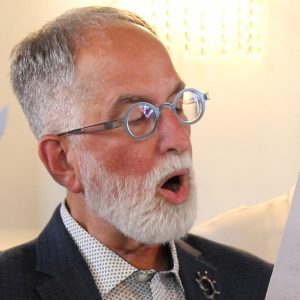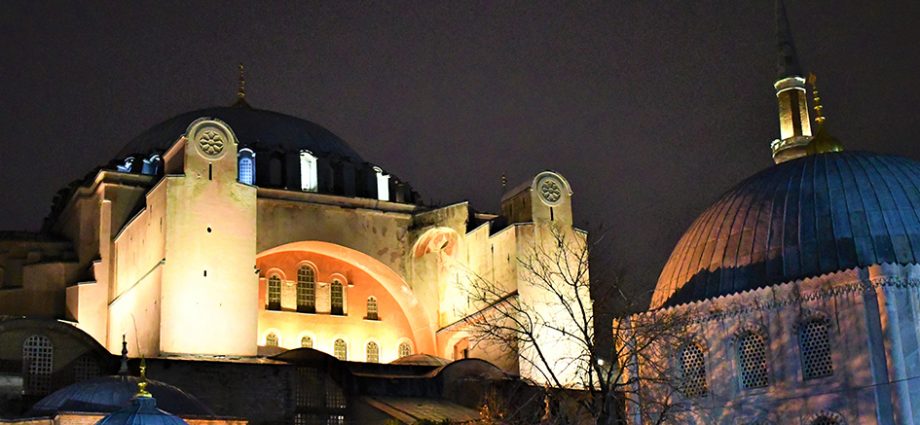Matthias Balzer & Ki Adams
Sharing spiritually-inspired choral music is a new, innovative, and relevant focus of choir meetings and choral activity all over the world. This topic was at the core of the well-attended panel discussion and dialogue held on Wednesday, 26 April 2023 at the World Symposium on Choral Music (WSCM) in Istanbul, Türkiye.
The panel was composed of participants from various countries with different spiritual backgrounds:
- Ki Adams (Canada), IFCM and moderator of the discussion
- Matthias Balzer (Germany), International Federation Pueri Cantores
- Gábor Móczár (Hungary), IFCM
- Ramona Wegenast (Germany), Marktoberdorf Music Sacra
- Naomi Faran (Israel), Moran Choir
- Hussein Janmohamed (Canada), composer and independent scholar
- Sherryl Sewepagaham (Canada), composer and member of the Little Red River Cree Nation
The discussion focused broadly on the impact that a conscious exchange of spiritually-inspired choral music from diverse cultural and religious communities might have on the pursuit of deeper understanding between singers and, ultimately, a more peaceful world.
Panelists unanimously agreed that 70% of the choral compositions performed at international choral events have a spiritual origin, even though they are generally selected by choral directors and choirs who have no religious background or affiliation.
This compositional and programming phenomenon was seen as a good starting point for creating and facilitating new encounters and exchanges that focus not simply on the music itself, but also on its origin and background. This is all the more relevant in the case of choral singing, in which the combination of words and music provides a much more tangible and holistic means of access to other cultures (and religions) than theoretical and academic discussions.
Opportunities for this sharing of spiritually-inspired choral music are provided by choir festivals and competitions, within ensembles whose singers come from different religious/spiritual contexts, and through learning and performing compositions that combine music with different spiritual origins.
Several panelists described their effective, productive experiences with these kinds of exchanges:
- Sherryl Sewepagaham, whose work with the Vancouver Youth Choir (Canada) includes choral music rooted in and influenced by different spiritual practices (Islam and Indigenous communities)
- Hussein Janmohamed, who consciously combines different spiritual backgrounds and practices in his compositions for choir
- Ramona Wegenast, whose biennial festival Musica Sacra International brings together musicians from the world’s major religions for a week in Marktoberdorf, Bavaria (Germany) for concerts as well as discussions/workshops with schoolchildren from the region
- Naomi Faran,who reported her encouraging experiences when singers who come from different, and sometimes even hostile, regions make music together
The initiators of the panel, Gábor Móczár and Matthias Balzer, expressed their view that spirituality is an essential part of what it means to be human, and finds expression in different religions and spiritual practices. As music crosses linguistic and cultural boundaries, the unique practice of sharing spiritually-inspired choral music could therefore, on the one hand, address the need for transcendent expression among human beings and, at the same time, promote mutual understanding in a multipolar world marked by many conflicts.
Together with Ki Adams, who carefully moderated the panel, all panelists and delegates agreed that the WSCM session was only the prelude to further steps, in the course of which best-practice examples and ideas will be collected and concrete plans of action will be promoted.
All participants, including the audience, were unanimous in their opinion that this idea of focused exchange should be pursued more intensively and implemented as widely as possible in future choir encounters as well as in choral compositions.
The panel was framed and structured by short vocal performances by Roula Abou Baker (Lebanon), Sherryl Sewepagaham (Canada), and Hussein Janmohamed (Canada), the quality and distinct stylistic and spiritual diversity of which delighted the audience.
Edited by Katie Sykes, UK
 Matthias Balzer was born in Fulda in 1955. After graduating from high school, he studied church music at the Hochschule für Musik und Darstellende Kunst in Frankfurt am Main from 1975 to 1979, including organ with Prof. Edgar Krapp, and choral and orchestra conducting with Prof. Helmut Rilling. During his organ solo studies, which he completed in 1982, he undertook chamber music and piano accompaniment lessons with Prof. Rainer Hoffmann and Prof. Hartmut Höll, as well as harpsichord lessons with Johann Sonnleitner, among others. From 1980 to 1995 Balzer worked as a church musician at St. Nikolaus in Friedrichshafen, Lake Constance. There he was, among other things, founder and artistic director of the annual “International Organ Academy, Lake Constance”. In the period between 1995 and 2021, Matthias Balzer was responsible for church music in the diocese of Trier and directed the Episcopal Church Music School there. From 2007 to 2019, Matthias Balzer was president at the helm of the German Children’s and Youth Choir Association Pueri Cantores. He is currently vice-president of the national as well as the international choral association Pueri Cantores, where he is responsible in particular for the planning and implementation of the choral festivals. In addition, Balzer also represents the German choral associations as vice-president in the “Bundesmusikverband Chor und Orchester”, the association of all amateur music associations in Germany. matthias.balzer@pueri-cantores.de
Matthias Balzer was born in Fulda in 1955. After graduating from high school, he studied church music at the Hochschule für Musik und Darstellende Kunst in Frankfurt am Main from 1975 to 1979, including organ with Prof. Edgar Krapp, and choral and orchestra conducting with Prof. Helmut Rilling. During his organ solo studies, which he completed in 1982, he undertook chamber music and piano accompaniment lessons with Prof. Rainer Hoffmann and Prof. Hartmut Höll, as well as harpsichord lessons with Johann Sonnleitner, among others. From 1980 to 1995 Balzer worked as a church musician at St. Nikolaus in Friedrichshafen, Lake Constance. There he was, among other things, founder and artistic director of the annual “International Organ Academy, Lake Constance”. In the period between 1995 and 2021, Matthias Balzer was responsible for church music in the diocese of Trier and directed the Episcopal Church Music School there. From 2007 to 2019, Matthias Balzer was president at the helm of the German Children’s and Youth Choir Association Pueri Cantores. He is currently vice-president of the national as well as the international choral association Pueri Cantores, where he is responsible in particular for the planning and implementation of the choral festivals. In addition, Balzer also represents the German choral associations as vice-president in the “Bundesmusikverband Chor und Orchester”, the association of all amateur music associations in Germany. matthias.balzer@pueri-cantores.de
 Ki Adams, a native of Birmingham, Alabama (USA), is an honourary research professor at Memorial University of Newfoundland (Canada) where he taught in the undergraduate/graduate music and music education programs for 25 years. Currently a board member for the International Federation of Choral Music and President of the World Youth Choir Foundation, Ki is Founding Co-Director of The Singing Network, a collective for generating and producing a series of voice-singing-choral experiences ranging from workshops, seminars, master-classes, and dialogues to the biennial International Symposium on Singing and Song. kiadams@mun.ca
Ki Adams, a native of Birmingham, Alabama (USA), is an honourary research professor at Memorial University of Newfoundland (Canada) where he taught in the undergraduate/graduate music and music education programs for 25 years. Currently a board member for the International Federation of Choral Music and President of the World Youth Choir Foundation, Ki is Founding Co-Director of The Singing Network, a collective for generating and producing a series of voice-singing-choral experiences ranging from workshops, seminars, master-classes, and dialogues to the biennial International Symposium on Singing and Song. kiadams@mun.ca
Head photo © Ki Adams

